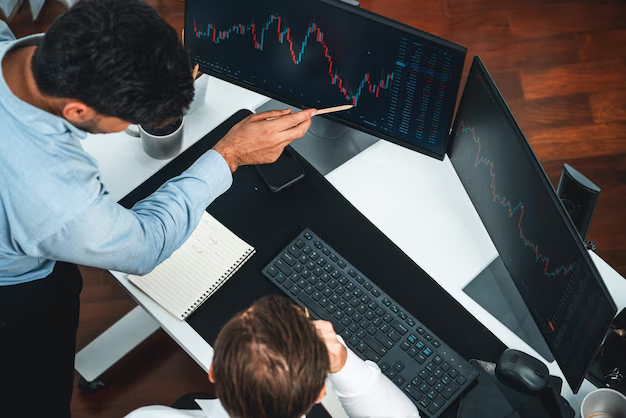Understanding the Forex Exchange Market: A Guide for Beginners
Imagine being able to buy or sell any currency at any time from anywhere in the world. That's the power of the Forex Exchange Market, a dynamic and highly liquid market where currencies are traded globally. Whether you're a novice seeking to understand the basics or a seasoned investor looking to diversify, this guide will help you delve into the intricacies of the forex market and provide actionable insights.
🌍 What is the Forex Exchange Market?
The Foreign Exchange Market, commonly referred to as Forex or FX, is a decentralized global marketplace where national currencies are traded. Unlike stock exchanges, Forex doesn't have a centralized exchange. Instead, trades are conducted over-the-counter (OTC) through a network of banks, dealers, and financial institutions. This setup allows for a 24-hour trading cycle, accommodating different time zones as major financial centers—such as London, New York, Tokyo, and Sydney—operate throughout the day.
🤔 Why Participate in Forex Trading?
Forex trading is driven by various purposes and motivations:
Profit Making: Investors and traders seek to capitalize on the fluctuation of currency exchange rates. Profits are made by buying low and selling high, or vice-versa, depending on market conditions.
Hedging: Companies engaging in international trade use Forex to hedge against potential currency risks. By locking in current exchange rates, businesses can safeguard against losses due to unfavorable shifts in the market.
Speculation: Many traders join Forex without physically owning the currencies. Instead, they speculate on the price movements to gain financial returns.
🔄 How Does Forex Trading Work?
At its core, Forex trading involves exchanging one currency for another. Each transaction is quoted in pairs, such as EUR/USD (Euro/US Dollar) or JPY/GBP (Japanese Yen/British Pound). The first currency in a pair is the base currency, and the second is the quote currency. If you believe the Euro will strengthen against the Dollar, you might decide to buy EUR/USD.
⚖️ The Role of Currency Pairs
Currencies are traded in pairs, and each pair represents a different trade:
- Major pairs include the most traded currencies globally, like EUR/USD, GBP/USD, and USD/JPY.
- Minor pairs involve currencies that are less frequently traded.
- Exotic pairs consist of a major currency paired with the currency of an emerging economy.
📈 Movement of Currency Pairs
Currency values fluctuate due to various factors like changes in interest rates, economic indicators, geopolitical events, and market sentiment. Successful traders often study these elements to predict future currency movements.
Getting Started with Forex
To embark on a Forex trading journey, certain steps are pivotal:
- Learn the Basics: Understand currency pairings, market terminology, and basic trading strategies.
- Choose a Broker: Since Forex is OTC, selecting a reliable broker is crucial. Look for regulated brokers with transparent fee structures.
- Open a Trading Account: Most brokers offer demo accounts, allowing you to practice without risking real money.
- Develop a Strategy: Different strategies suit various goals, risk tolerances, and time commitments. Whether you prefer day trading or long-term positions, your strategy should align with your objectives.
- Start Trading: Begin with small investments and gradually increase your exposure as your confidence and understanding grow.
📚 Forex Trading Tools and Platforms
For successful trading, familiarity with various tools and platforms is beneficial:
- Trading Platforms: Most trading is done through platforms like MetaTrader 4 or 5, offering charting tools, technical indicators, and trading signals.
- Economic Calendars: Stay informed about upcoming economic events that may impact currency prices.
- Analytical Software: Use various analytics and data tools for technical and fundamental analysis.
🤓 Education and Continuous Learning
Forex trading requires continuous learning. Read books, attend webinars, join forums, and engage with experienced traders. Keeping abreast of market trends and news will enhance your trading acumen.
Risks and Challenges in Forex Trading
While Forex offers potential rewards, risks are inherent:
- Market Volatility: Exchange rates can change rapidly, leading to potential losses.
- Leverage Risks: Leverage can amplify gains but also magnifies losses. Utilize it cautiously and understand its implications fully.
- Brokerage Issues: Not all brokers offer the same conditions. Investigating broker reviews and regulatory status is essential for security.
Pro Tip: 🧩 Diversify your trading strategy and never risk more than you can afford to lose.
The Impact of Global Events on Forex
The Forex market doesn't exist in isolation; it's influenced by global developments:
- Economic Releases: Reports like employment data, interest rates, and GDP figures impact currency prices.
- Political Developments: Elections, policy changes, and geopolitical tensions can influence market sentiments.
- Natural Disasters: These can disrupt markets, impacting supply chains and economic stability, leading to currency fluctuations.
🔑 Key Takeaways
- Forex Basics: Comprehend the terminology and fundamental principles of currency trading.
- Choose a Strategy: Tailor your approach based on personal goals and risk assessments.
- Stay Informed: Regularly update your knowledge through educational resources and staying connected to market news.
- Risk Management: Employ prudent risk management techniques, understanding both leverage and market dynamics.
- Monitor Global Events: Assess how worldwide developments impact currency valuations.
Practical Consumer Tips
Here's a quick reference guide for navigating the Forex market:
- 🔍 Research Brokers: Ensure they're reputable and regulated.
- 💼 Use Demo Accounts: Hone your skills without financial risks.
- 📊 Leverage Wisely: Understand its pros and cons before using it.
- 🗺️ Stay Updated: Global events shape the market; remain informed.
- 🎯 Set Goals: Establish clear trading purposes and limits.
Forex trading can be a rewarding endeavor if approached with the right mindset, tools, and information. By understanding the market's operations and developing a robust strategy, you can navigate the complexities of Forex with increased confidence and potential for success. Remember, every expert trader was once a beginner, so take your learning journey seriously and invest the time needed to master the market.

